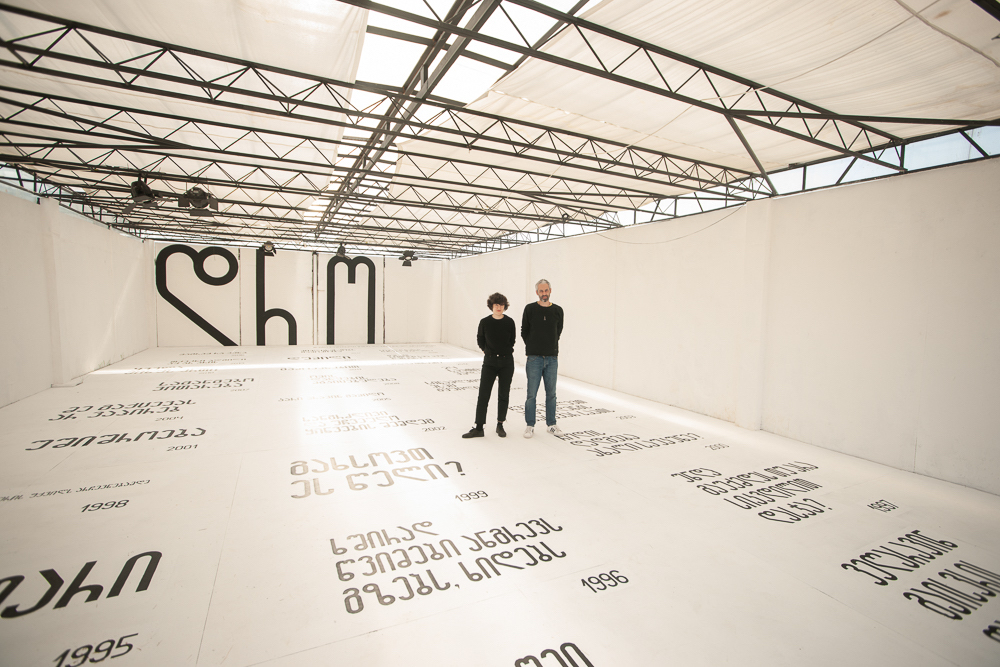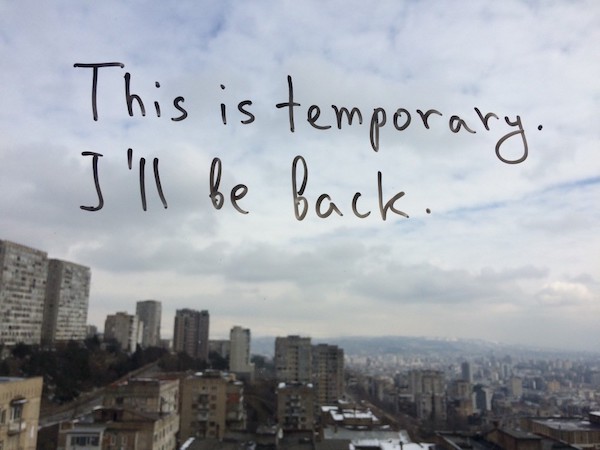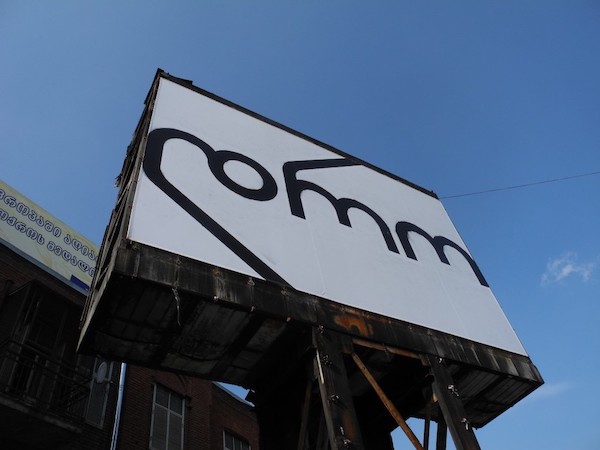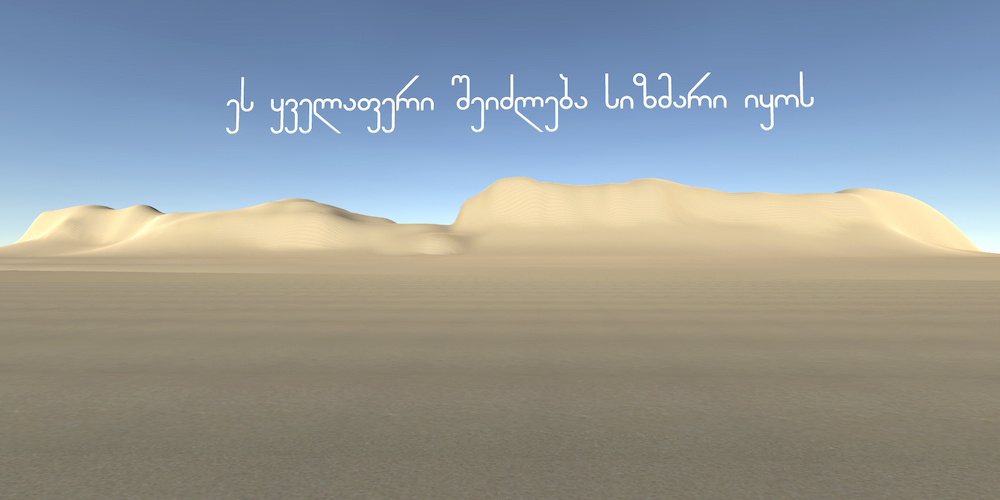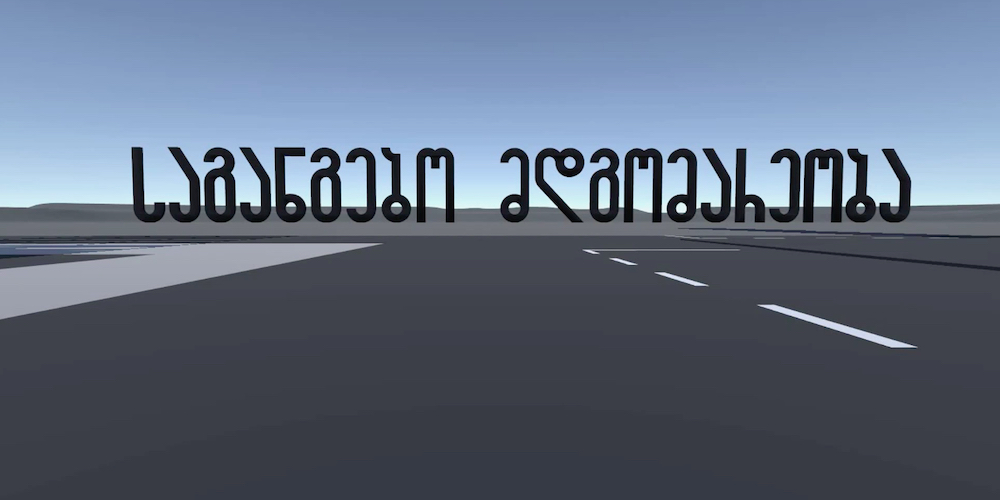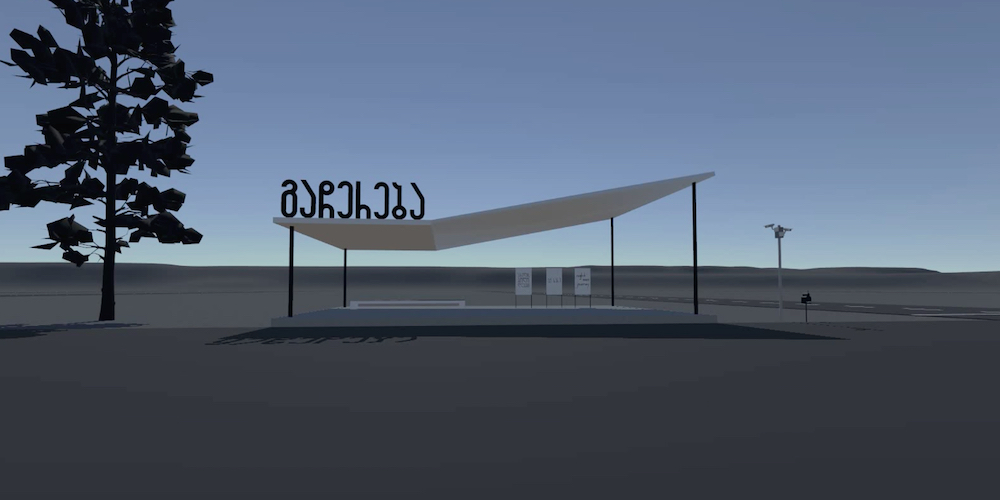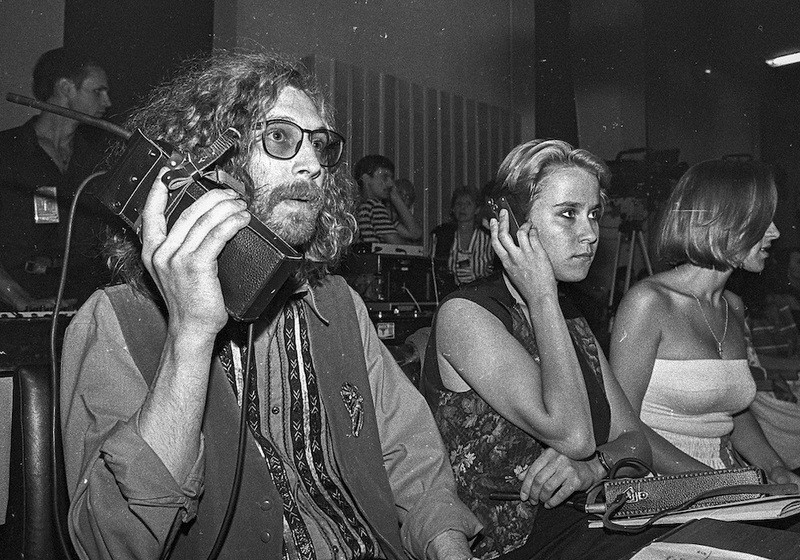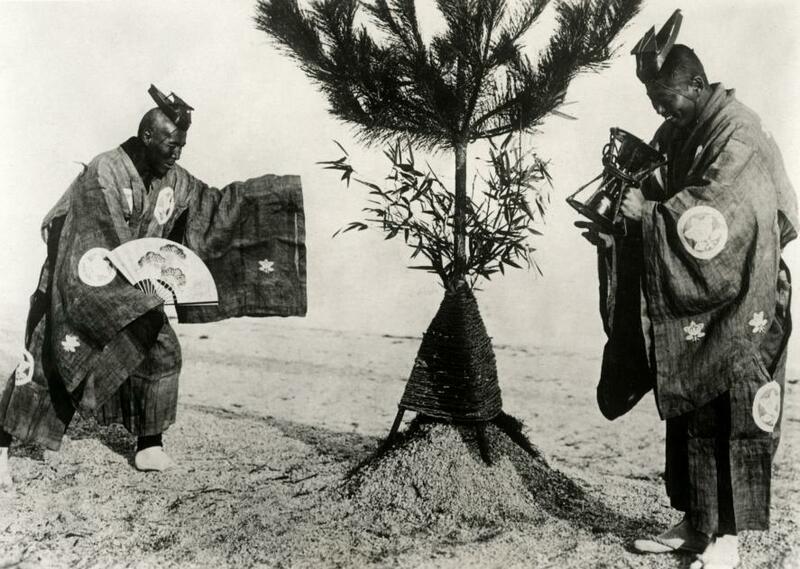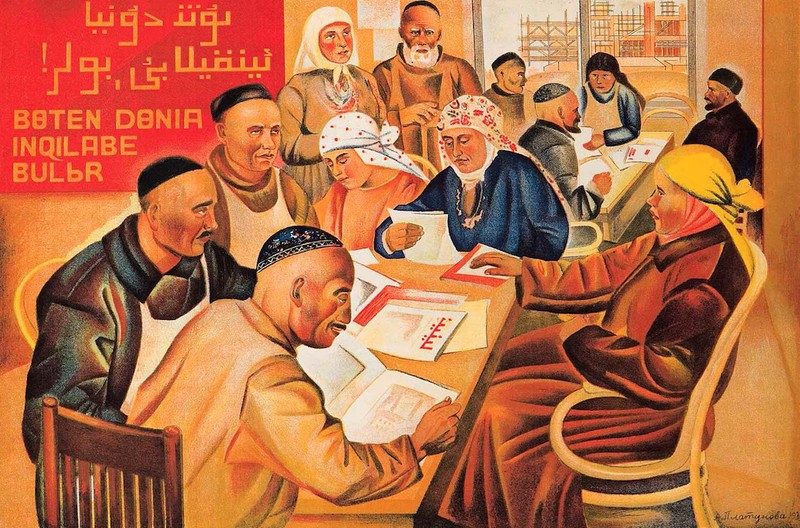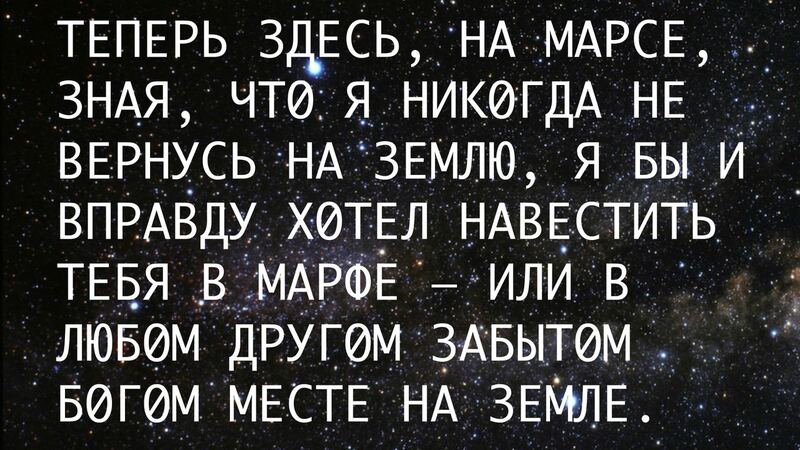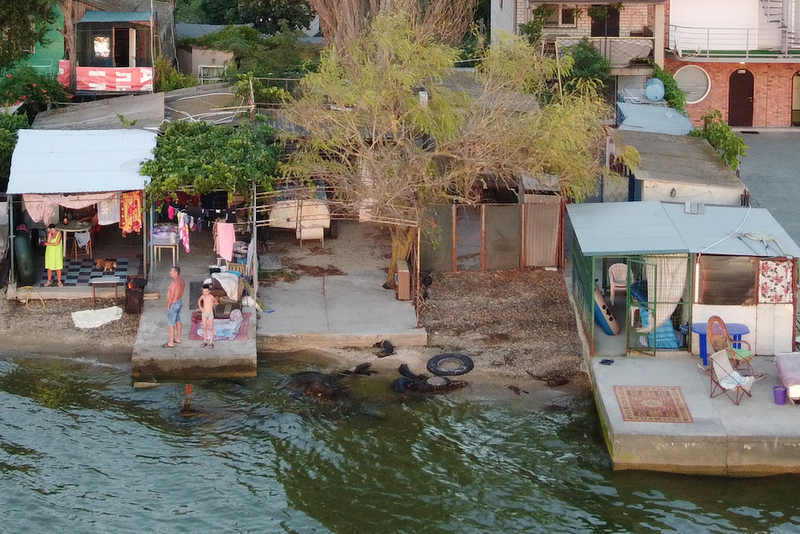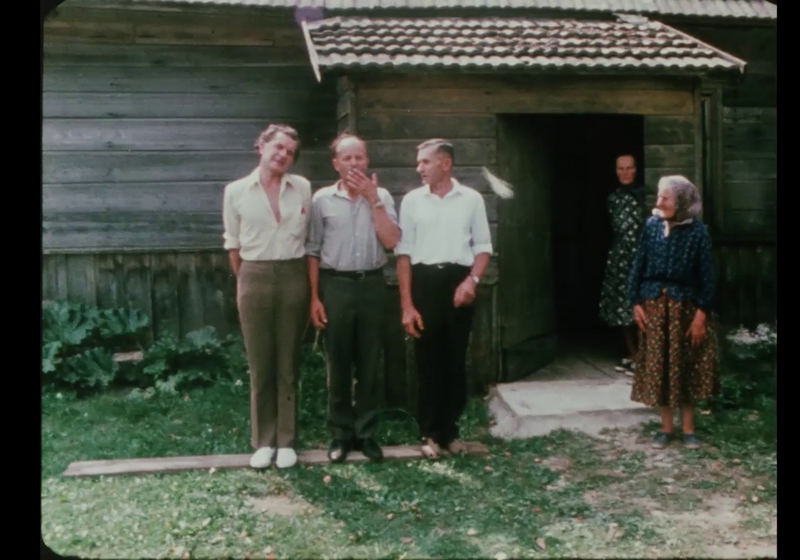by Mariam Natroshvili and Detu Jincharadze
In an exclusive premier for EastEast, the Tbilisi-based artist duo Mariam Natroshvili and Detu Jincharadze present the video work Lost and Found: a Spell to Return a Lost One. As an introduction to the film and the duo’s work in general, Mariam speaks about her childhood in Georgia, her first projects with her partner Detu, experimenting with video games as a creative framework, and other inspirations.
My name is Mariam. Mariam Natroshvili.
I was born in the Caucasus, in the city of Tbilisi where two worlds—the East and the West—intersect. I grew up on the edge of two eras, when the Soviet Union had ended and a new stage was beginning. This time in Georgia commenced with demonstrations, wars, darkness, and poverty. Collecting and playing with bullet shells in the backyard, reading fairy tales in the evening, skipping lessons at the freezing-cold school building—we were waiting for the end of the world in 2000.
The 90s taught me the concept of DIY—the most precious thing I’ve learned. If you don’t have something, you should create it yourself. It is a thought process that will help you find the way out of any given situation.
If I was to pick two memories as two signs from these times, these are the two “frames” that I remember vividly: 1) The gray carcass of an abandoned construction site—an unfinished, ceased time, and 2) Prince of Persia—my first digital memory. I was kicked out of school in the 9th grade for being a hooligan—I was writing on everything—the desks, walls, clothes.
It took me a while to decide what I wanted to do next. I tried out Turkish language and literature, but was missing the lectures as well. I finished my master’s degree in Istanbul but instead of writing a thesis, I made a film about genies which later disappeared. Since those times a lot of things have disappeared—both from my memory and the D-disk.
In 2011, Detu and I started living and working together. Detu is an architect and I had known him for quite some time, but we didn’t fall in love until the edge of the new decade. Since 2011 we have been doing everything together. We started with words. The first thing we ever wrote on a street wall was THE END. I thought we could simply use brushes to paint the words but Detu tried to convince me to design our own font and to make stencils. I am very stubborn. At night, we went out and wrote on the garages behind our house with paint brushes. The writing is still there—and it doesn't look very good (afterward, Detu did design a font and now we use our own).
We live on the edge of Tbilisi, on a hill in a Soviet tower. Behind the tower, close to the edge of Tbilisi, it says THE END on the garages. Living in Georgia is always accompanied by the sense of an ending. At times, the Patriarch announces the completion of times, at others, the neighboring country moves its border forward or political parties make threats that things are close to the finish line. The end is always different, but the feeling that now, in one second, in one moment, everything can change and reality can turn upside down—this feeling is endless.
So that’s how we started as well—with an ending. We were writing words and sentences around the city without having permission. We were arrested a few times and even spent a night in a prison cell. We weren’t inventing words or sentences, rather, we were finding them. We picked some words from the Internet, social media, spam, software, websites: I’m feeling lucky, home, search for people, places, and things, it's not you, etc. We had more time then. We were wandering around and searching for new locations. Some abandoned, function-deprived Soviet buildings, we were using those for our writing. These buildings were an important part of the work itself. An introduction of sorts.
In 2015, we started writing in Georgian. DRO (Time)—was the first word we placed on a billboard on Republic Square. DRO. These words, sentences, Georgian or English, were the titles of places. The titles of unnamed/unknown stories. These words were the kind of keys as well—the keys to abandoned and forgotten places. A logical continuation of our practice was the Word Festival which we started in 2019, within the framework of Festinova, at Art Villa Garikula. This platform examines the connection between literature and fine arts and tries to create a new space in between the two.
Bottom: DRO (2015) and This is temporary, I'll be back (2018)
The rest of what was happening before that I don’t really remember. 2020 became the beginning of new times. We left Tbilisi on January 2nd and only came back home in March. This trip felt like a journey between realities, as once we got back we faced a new actuality in a new place. The empty city, lockdown, curfew. Staring at screens within four walls—we could only do so for so long. For me, there are three realities—the one that's the same for everyone around, dreams, and the digital world. When the first reality was ruined, we decided to keep working in the digital reality instead. This is how we moved from a public space to a virtual one.
The first thing we did was the exhibition All this might be a dream. At a virtual copy of the Art Villa Garikula building, we showcased the artworks of some thirty artists. The exhibition-game was set on a platform that allowed visitors to “play,” to wander around the Garikula simulation and observe presented work, or to watch the so-called walk through: a video/documentation made by us. We continued this line—the exhibitions within a video game—and there are more coming, including Contemporary Art Museum, and an exhibition that tells the stories of those repressed during Soviet times. The video called Love in the Times of Curfew was also created, inspired by the basis of a video game, as part of our other project—the Tbilisi Online Biennale.
by Mariam Natroshvili and Detu Jincharadze
At the moment, we are working on two directions: the exhibitions that are inspired by games, where we show other people’s work or archival materials, and videos, both documentary or CGI, created on a video game platform. Curfew was an interactive video/CGI installation that interpreted the new and random times into buildings, words, and colors. Lost and Found: a Spell to Return a Lost One is a video that’s creation is also based on the structure of a game.
The places that we create don’t actually exist. However, if you look closely you can recognize Tbilisi in them—a city full of mistakes and secrets. A gray and dusty town of lost gardens, Soviet blocks, abandoned construction sites, tears, fear, and love. And, if these words and feelings could describe other cities as well, then these poems (I call these videos poems) could be about other cities too. Far away or close enough, on the East or the West, on all four sides. A city viewed as feelings and conditions. In our work, whether its text or a CGI/documentary video, we translate political or personal feelings into visual material and words, and turn them into signs.
Lastly, if I can be brief about what we are drawn to and what inspires us: people and cities, borders, mistakes, contemporary rituals and mythology, Heterotopias, non-places, forgotten and lost stories. The conditions that are caused by modern politics and loneliness. Something that remains but is invisible, something we fear and prefer not to talk about.
Whatever is not here can be found on: sadarismelia.com
Translated from Georgian by Elene Kobidze
ჩემი სახელია მარიამი. მარიამ ნატროშვილი.
დავიბადე კავკასიაში, ქალაქ თბილისში, ქალაქში სადაც ორი მხარე - აღმსოავლეთი და დასავლეთი ერთმანეთს ხვდება. ვიზრდებოდი ორი დროის გადაკვეთისას. სრულდებოდა საბჭოთა კავშირი და იწყებოდა ახალი დრო. საქართველოში ახალი დრო დაიწყო დემონსტრაციებით, ომებით, სიბნელით და გაჭირვებით. ბავშვობაში ეზოში ტყვიებს ვაგროვებდი, საღამოობით სანთლის შუქზე ვკითხულობდი შუა აზიურ ზღაპრებს, სკოლაში ციოდა და გაკვეთილებს ხშირად ვაცდენდი. ამბობდნენ რომ 2000 წელს სამყარო დასრულდებოდა.
90-იანებმა მასწავლა DIY - ეს ყველაზე ძვირფასია რაც მაშინ ვისწავლე. თუ რამე არ გაქვს, შენით უნდა გააკეთო. ეს ფიქრის ხერხია, რომელიც ყველა მდგომარეობიდან გაპოვნინებს გამოსავალს.
ორი მოგონება რომ ავარჩიო, ამ დროის ორი ნიშანი, ორი კადრი რაც დამამახსოვრდა არის 1)მიტოვებული მშენებლობის ნაცრისფერი კარკასი, დაუსრულებელი, შეჩერებული დრო და 2) Prince of Persia - პირველი ციფრული მოგონება. სკოლიდან მე-9 კლასში გამომაგდეს. კედლებზე წერის და ხულიგნობის გამო. ყველაფერზე ვწერდი, მერხებზე, კედლებზე, ტანსაცმელზე.
დიდი ხანი ვფიქრობდი რა უნდა მეკეთებინა, ვსწავლობდი თურქულ ენასა და ლიტერატურას, მაგრამ ლექციებზე არ დავდიოდი. მაგისტრატურა სტამბოლში დავამთავრე, სამაგისტრო თემის დაწერის ნაცვლად ჯინებზე გადავიღე ფილმი, რომელიც ერთ დღესაც გაქრა. იმ დროიდან ბევრი რამე გაქრა, მეხსიერებიდანაც და D დისკიდანაც.
2011 წელს მე და დეთუმ ერთად ცხოვრება და მუშაობა დავიწყეთ. დეთუ არქიტექტორია, დიდი ხანია ვიცნობდი, მაგრამ ერთმანეთი ახალი ათწლეულის დასაწყისში შეგვიყვარდა. 2011 წლიდან ყველაფერს ერთად ვაკეთებთ. სიტყვებით დავიწყეთ. პირველი რაც ქუჩაში კედელზე დავწერეთ იყო THE END. მე ვუმტკიცებდი რომ ფუნჯითაც კარგად დავწერდით, დეთუ მეუბნებოდა, ჯობია ჩვენი შრიფტი დავხაზოთ და სტენსილებით ვწეროთო. ღამე წავედით და სახლის უკან, გარაჟებზე ფუნჯით დავწერეთ. დღემდე წერია, საშინელება გამოვიდა. (ამის შემდეგ დეთუმ ფონტი დახაზა და ჩვენ სისტყვებს ჩვენივე ფონტით ვწერთ.)
თბილისის ნაპირზე ვცხოვრობთ, თბილისის მთებში, საბჭოთა კოშკში. კოშკის უკან, გარაჟებზე, თბილისის საზღვრათან წერია THE END. აქ, საქართველოში ცხოვრებას, მუდმივად გასდევს დასასრულის შეგრძნება. ხან პატრიარქი აანონსებს ბოლო ჟამს, ხან მეზობელი ქვეყანა წევს საზღვარს, ხან პოლიტიკური პარტიები გვპირდებიან დასასრულს. ეს დასასრული სხვადასხვანაირია, მაგრამ, ის გრძნობა რომ - აი ერთ წამს, აი ეხლა, შეიძლება ყველაფერი შეიცვალოს, სინამდვილე ამოყირავდეს, სხვანაირი გახდეს - არ სრულდება.
აი, ასე დავიწყეთ - პირიქით, დასასრულით. სიტყვებს და წინადადებებს ვწერდით უნებართვოდ ქალქის კედლებზე. რამდენჯერმე დაგვიჭირეს, ერთი ღამე უცხო ქალაქის კაპეზეზეც გვაქვს გატარებული. სიტყვებს და წინადადებებს არ ვიგონებდით, ვპოულობდით. ვიღებდით სიტყვებს ინტერნეტიდან, სოციალური მედიიდან, სპამიდან, პროგრამებიდან, საიტებიდან: I'm feeling lucky, home, search for people, places and things, its not you და ა.შ. მაშინ ბევრი დრო გვქონდა. დავდიოდით და ადგილებს ვეძებდით. მიტოვებულ, ფუნქცია დაკარგულ საბჭოთა შენობებს და ზემოდან სიტყვებს ვაწერდით. შენობები, კედლები სადაც ვწერდით, ნამუშევრის მნიშვნელოვანი ნაწილი იყო. ერთგვარი შესავალი.
2015 წელს დავიწყეთ ქართულად წერა. დრო - იყო პირველი სიტყვა, რომელიც რესპუბლიკის მოედანზე, ბილბორდზე გამოვაკარით. დრო. ეს სიტყვები, წინადადებები, ინგლისური თუ ქართული. ადგილების სათაურები იყო, უხილავი ამბების სათაურები. სიტყვები გასაღებებიც იყო - მიტოვებული და დავიწყებული ადგილების გასაღები. წერის ლოგიკური გაგრძელება სიტყვების ფესტივალი გახდა, რომელიც 2019 წელს გარიყულაში, ფესტინოვას ფარგლებში დავიწყეთ. პლატფორმა, რომელიც ლიტერატურას და ვიზუალურ ხელოვნებას შორის კავშირებს ეძებს და ცდილობს ამ ორი სფეროს გადაკვეთაზე ახალი სივრცე შექმნას.
სხვა დანარჩენი რაც მანამდე ხდებოდა, აღარ მახსოვს. 2020 ახალი დროის დასაწყისი გახდა.
თბილისიდან 2 იანვარს წავედით და სახლში მარტში დავბრუნდით. ეს რეალობებს შორის მოგზაურობას გავდა, რადგან როდესაც დავბრუნდით, სხვაგან, სხვა სინამდვილეში ამოვყავით თავი. ცარიელი ქალაქი, ლოქდაუნი, საგანგებო მდგომარეობა. 4 კედელს შორის გამოკეტილებმა და ეკრანებს მიჩერებულებმა რამდენიმე დღე გავძელით. ჩემთვის სამი რეალობა არსებობს - ყველასათვის საერთო რეალობა, სიზმრები და ციფრული სამყარო. როდესაც პირველი რეალობა გაფუჭდა, გადავწყვიტეთ მუშაობა ციფრულ რეალობაში გაგვეგრძელებინა. ასე გადავინაცვლეთ საჯარო სივრციდან ვირტუალურ სივრცეში.
პირველი, რაც გავაკეთეთ იყო გამოფენა “ეს ყველაფერი შეიძლება სიზმარი იყოს”. ხელოვნების ცენტრ არტ ვილა გარიყულას ვირტუალურ ასლში 30 მხატვრის ნამუშევარი გამოვფინეთ. გამოფენა ვიდეო თამაში პლატფორმაზე ავაწყეთ, დამთვალიერებლებს შეეძლო “ეთამაშა” - გარიყულას სიმულაციაში ესეირნა და ნამუშევრები დაეთვალიერებინა ან ე.წ. walk through, ჩვენ მიერ გადაღებული ვიდეო დოკუმენტაცია ენახა. ეს ხაზი, გამოფენები ვიდეო თამაშში, გავაგრძელეთ და მალე ბევრ საინტერესო გამოფენებს ნახავთ, მათ შორის “თანამედროვე ხელოვნების მუზეუმს” და საბჭოთა კავშირში რეპრესირებულთა ზეპირი ისტორიების გამოფენას. ჩვენი პროექტის - თბილისის ონლაინ ბიენალეს ერთ-ერთი ნაწილიც “სიყვარული კომენდანტის საათის დროს” ვიდეო თამაშის ძრავზე შეიქმნა.
ახლა ორი მიმართულებით ვმუშაობთ: ვიდეო თამაშების ძრავზე შექმნილი გამოფენები, სადაც სხვის ნამუშევრებს ან საარქივო მასალებს ვაჩვენებთ და ვიდეოები, რომლებიც ხან დოკუმენტურია, ხან კომპიუტერული ანიმაციითაა შექმნილი და ვიდეო თამაშის პლატფორმაზე იქმნება. “საგანგებო მდგომარეობა” კი ვიდეო/ინტერაქტიული cgi ინსტალაცია იყო, რომელიც იმ ახალ და უცნაურ დროს შენობებად, სიტყვებად და ფერებად თარგმნიდა. “Lost and Found - შელოცვა დაკარგულის დასაბრუნებლად” ვიდეოა, რომელიც სწორედ ვიდეო თამაშის ძრავზეა აწყობილი.
ადგილები, რომელსაც ვქმნით, სინამდვილეში არ არსებობს. თუმცა, თუ კარგად დააკვირდებით, ამ ადგილებში თბილისს ამოიცნობთ. შეცდომებით და საიდუმლოებით სავსე ქალაქს. დაკარგული ბაღების, საბჭოთა კორპუსების, მიტოვებული მშენებლობების, ცრემლების, შიშის და სიყვარულის, ნაცრისფერ, მტვრიან ქალაქს. და თუ ეს სიტყვები ან გრძნობები სხვა ქალაქებსაც აღწერს, მაშინ ეს ლექსები (ამ ვიდეოებს მოკლედ ლექსებს ვეძახი) სხვა ქალაქებზეცაა. შორს თუ ახლოს, აღმოსავლეთით, თუ დასავლეთით, ოთხივე მხარეს. ნებისმიერ ქალაქზე, როგორც გრძნობებზე, როგორც მდგომარეობებზე. ნამუშევრებში, იქნება ეს ტექსტი თუ cgi/დოკუმენტური ვიდეო, პოლიტიკურ თუ პირად გრძნობებს გამოსახულებებად და სიტყვებად ვთარგმნით, ნიშნებად ვაქცევთ.
ბოლოს, რამდენიმე სიტყვით რომ აღვწერო, ეს არის რაც გვაინტერესებს და რაზეც ვფიქრობთ: ქალაქები და ადამიანები, საზღვრები, თანამედროვე რიტუალები და მითოლოგია, შეცდომები, ჰეტეროტოპიები, არ - ადგილები, დავიწყებული და დაკარგული ამბები. მდგომარეობები, რომელსაც თანამედროვე პოლიტიკა, მარტოობა იწვევს. ის რაც იკარგება და რაც არ ჩანს, რისიც გვეშინია და რაზეც არ გვინდა ლაპარაკი.
რაც აქ ვერ მოხვდა, შეგიძლიათ აქ ნახოთ: sadarismelia.com
